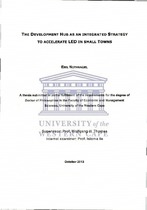The development hub as an integrated strategy to accelerate led in small towns
Abstract
Evolving out of my past experience as municipal manager, the study addresses one of the topical issues in municipalities, viz. the quest for more effective and sustainable local economic development (LED) in small towns. Through an extensive review of the literature and best practices of LED among South African and international municipalities, viable and reproducible strategies were examined and compared. The focus of my in depth research falls primarily on towns in the Western Cape, but lessons from other parts of South Africa also form part of this research. The conclusions drawn are not only relevant in South Africa, but can also be applied in southern Africa and other African sub-continents. Based on the qualitative evidence gathered from three in-depth case studies and a Western Cape sample of tourism places, the study explores the interaction of public- and private-sector involvement in the generation of LED momentum. As such the study focuses on the principles of successful public-private partnerships and how such partnerships can be enhanced through different types of projects. The study presents an LED framework, also referred to as a "development hub", to bring together the different elements of an integrated strategy. Based on the lessons drawn from the case studies and the literature review, the final section of the study presents a strategy framework which should be useful and applicable to other small towns, even if their growth is not tourism-based, and they are not located in South Africa's Western Cape. Hopefully the study will stimulate serious and in-depth debate among policy planners as well as key development stakeholders in small towns regarding viable LED strategising and the practical implementation of those strategies.

